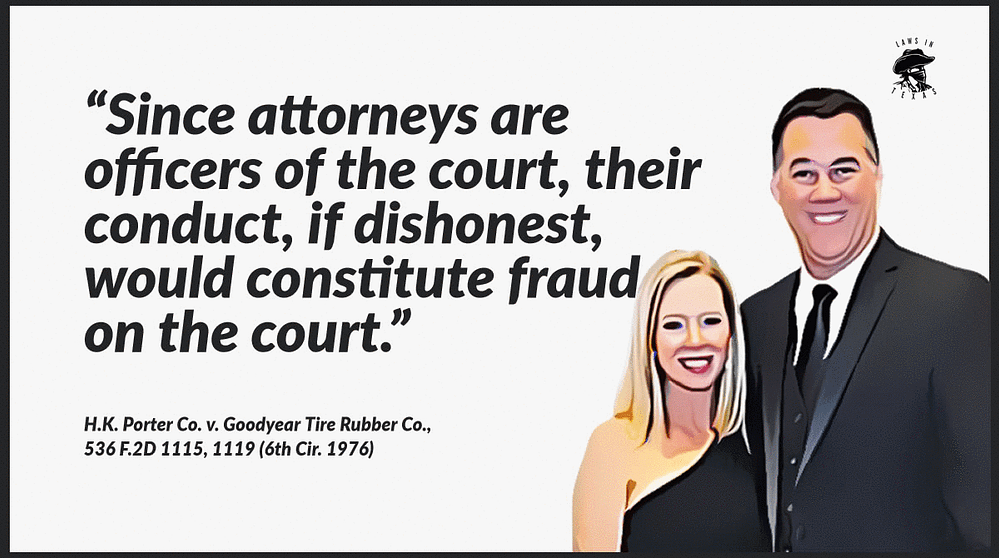LIT COMMENTARY
What you are about to read, still happens today. We start with clarifying the naming of the “Fifth Circuit”. This article discusses two Fifth Circuit courts. First, the case in point, references the Fifth Circuit Court of Appeal in Gretna, LA, which is a “State Appellate Court”. Then there is the Court of Appeals for the Fifth Circuit, the Federal Court.
In the underlying case, a former-staffer at the STATE Fifth Circuit wrote in a suicide note that for at least 13 years, clerks were preparing opinions and orders dismissing pro se criminal appeals (appx 300 in total) and a judge would sign “without even a cursory glance”.
In the Burkes case, clerks at the FEDERAL Court of Appeals are currently making decisions on serious motions and showing their bias towards pro se appellants openly at the Court of Appeals for the Fifth Circuit.
The Burkes compared their tandem cases and tandem motions at the Fifth Circuit and the Eleventh Circuit pertaining to staying the cases pending the Selia Law decision at the US Supreme Court.
The Eleventh Circuit followed procedure, in every motion presented, the answer was signed by a sitting judge. Not the case with the Fifth Circuit, where Clerks routinely sign the orders.
The other important take-away from the article below concerns judicial complaints. It is incredulous to us at LIT to comprehend how an Appellate Court complaint is heard by the same Court and the same judges that sit together. How do you think the complaint is going to be treated? Here’s your answer.
LIT is more familiar with the Federal Court of Appeals for the Fifth Circuit, where it is farcical that they referred to the FHFA in their recent Collins decision as being unconstitutional, citing omnipotence, yet they are following exactly the same structure, one which US Supreme Court Justice Sotomayor admits does not look good, yet she and the Court have refused to intervene.
It’s a nonsensical state of affairs where the Courts’ own lack of “separation of power” is an abuse of that power.
However, Justice Sotomayor was most likely writing this sheepishly as the same system is apparent at the US Supreme Court. The Burkes’ petition was rudimentarily denied as pro se filers and the Burkes suggest that it was only a clerk that made that decision. It was never presented before the full Court (and the US Supreme Court admits as much in their own court guidance instructions and rules).
Justice is not available for everyone, rich or poor, in the American judicial court system and as the framers demanded in crafting the Constitution. It is only for those with deep pockets and even deeper influence.
His Appeal in Louisiana Was a Sham Proceeding. But the High Court Won’t Review the Case
Louisiana automatically rejected appeals from prisoners who represented themselves. One prisoner hoped the Supreme Court would consider his conviction in the light of that scandal.
Published; 11 Dec. 2019
The U.S. Supreme Court refused on Monday to intercede in one of the biggest judicial scandals in modern Louisiana history.
The dry legal issues in the case of Louie Schexnayder center around the Antiterrorism and Effective Death Penalty Act, the Clinton-era federal statute designed to make it harder for criminal defendants to get federal judges to review their cases on appeal. The underlying facts of Schexnayder’s case, however, turn on systemic judicial misconduct in Louisiana that is unusual even by the standards of one of the most perennially troubled justice systems in the nation.
Schexnayder was convicted of second-degree murder two decades ago in Louisiana after a trial that raised a number of significant questions about the evidence against him and the way police and prosecutors presented it. A key witness against Schexnayder promptly recanted after trial, for example, and evidence that might have helped the defendant was lost or destroyed by the state, defense attorneys assert.
The case was no slam-dunk. Two jurors voted to acquit Schexnayder, but the state’s non-unanimous jury rule in place at the time doomed him to a life sentence without parole.
Representing himself back in 1998, Schexnayder on appeal cited at least nine reasons why his conviction should be overturned. Each was quickly rejected by Louisiana’s appellate courts with barely any explanation.
There was, at that point, nothing remarkable about his story. Schexnayder was just another defendant convicted of a violent crime in Louisiana whose case was quickly processed through a justice system in which judicial misconduct has in the past been excused or simply ignored.
But here the story takes a turn. What Schexnayder did not know was that pro se appeals — that is, when defendants represent themselves — did not at that time get reviewed by a duly-sworn, impartial judge. Instead, nearly 300 appeals written by prisoners were reviewed by staff members within the Fifth Circuit Court of Appeal and were automatically rejected using one of 15 pre-written legal justifications for the rejection. In other words, Schexnayder’s appeal fell victim to a sham proceeding that the appellate court had countenanced for 13 years.
Worse, the appeals court profited from its refusal to provide a meaningful appeal to defendants who could not afford to hire lawyers to help them with their post-conviction appeals. The Fifth Circuit billed local parishes $75,000 for the orders dismissing these pro se cases and then turned around and cited the automatic dismissals to state legislators to try to justify more funding for the court itself. The appellate court, in other words, defrauded local officials by charging them for a service — judicial review — they did not provide.
A short and disinterested affirmation by the Fifth Circuit panel regarding this 1983 constitutional case which shows Patrick’s abuse of Sturkin in front of a judge, telling lies “to maintain control over Sturkin and perpetuate her fraudulent SCHEME…” Sounds very familiar. pic.twitter.com/D33L2wgldN
— LawsInTexas (@lawsintexasusa) December 11, 2019
RECONSIDERATION DENIED (Jan 18, 2019) – Before OWEN, OLDHAM AND WILLETT, Circuit Judges. PER CURIAM:*
The scheme came undone nearly a decade after Schexnayder’s conviction only after one of its perpetrators, Jerrold Peterson, then the state court of appeal’s director of central staff, confessed it all in a suicide note in May 2007. Peterson wrote: “For probably the past 10 years, not one criminal writ application filed by an inmate pro se has been reviewed by a Judge on the Court. I prepared the ruling on each of those writ applications, and they were signed by a Judge, without so much as a glance at the application.” When the scandal was exposed, more than a decade ago, it was big news down in Louisiana. But rather than routing every one of the 300 affected appeals to state judges who had nothing to do with the Fifth Circuit, the justices of the Louisiana Supreme Court allowed some of the judges of the Fifth Circuit to re-evaluate all those appeals. Predictably, these do-overs only ratified the first review; not a single one of the petitioners got any relief.
Schexnayder now has lawyers, and together with their client at Angola State Prison they petitioned the justices in Washington to accept his case for review. Schexnayder had hoped to persuade at least five justices that they should resolve a conflict among lower federal appeals courts about the level of deference federal judges must give to state court rulings like ones denying him relief. The argument was simple: If the high court wouldn’t intercede in this case, where a state appeals court for years farmed out its work to a staffer to automatically deny appeals, what sort of state judicial misconduct on appeal would ever warrant federal review?
Louis Schexnayder unsuccessfully asked the Supreme Court to rescue him from a life sentence in Louisiana. COURTESY OF DEIRDRE FAUCHEUX

Lawyers for Louisiana, defending both Schexnayder’s conviction and the way it was handled, told the justices that the second review by the Fifth Circuit cured the deficiencies of the first — an argument that seems to have prevailed at the Supreme Court. Schexnayder had countered by arguing that the second review was no better than the first since it was conducted by Fifth Circuit judges tainted by the earlier round of misconduct. That argument failed to persuade even a single justice to accept the case for review.
Schexnayder’s case hasn’t received much attention. At least eight of the cases rubber-stamped by Jerry Peterson ended up as wrongful convictions, and it’s possible that an earnest review of Schexnayder’s appeal would end the same way. But the National Association of Criminal Defense Lawyers is the only group to file an “amicus” brief in the case. A federal court is not required to defer to how Louisiana handled this case, the association argues, where the due process violation is as serious as it was here.
The petition for judicial review, which Schexnayder himself wrote and filed, was rescheduled for review five times before it finally was denied Monday. Justice Sonia Sotomayor did not dissent but noted that “the re-review procedure adopted by the Louisiana courts… raises serious due process concerns. I expect that lower federal courts will examine the issue of what deference is due to these decisions when it is properly raised.” Given the history of this case, it seems unlikely that such a review ever will take place.
AT LIT, we do recognize how it must be painful having to affirm a former reforming inmate’s jury judgment of $350k due to the criminal acts of the parole officer. It’s not how the 5th Circuit have historically dealt with such matters. But they are not used to public eyes either. pic.twitter.com/433vqNeard
— LawsInTexas (@lawsintexasusa) December 11, 2019
Sotomayor voices concerns in case stemming from court staffer’s suicide note about pro se appeals
A court staffer’s suicide note and the response by an appeals court in Louisiana led U.S. Supreme Court Justice Sonia Sotomayor to raise due process concerns in a statement Monday regarding cert denial in a prisoner’s case.
Sotomayor said she saw “serious due process concerns” with a review of cases spurred by the 2007 suicide note and its revelations about automatic dismissals of appeals filed by prisoners without lawyers.
Sotomayor nonetheless agreed with the decision to deny the pro se cert petition by prisoner Louie Schexnayder Jr., who was convicted of second-degree murder and sentenced to life in prison.
Jerrold Peterson, the chief of central staff for Louisiana’s Fifth Circuit Court of Appeal, said in his suicide note that the appeals court had summarily denied appeals filed by people without attorneys for a 13-year period, according to Sotomayor, prior coverage by NOLA.com and Schexnayder’s cert petition.
Peterson reportedly said he prepared the rulings on petitions by inmates without representation, “and they were signed by a judge, without so much as a glance” at the underlying petitions or any review of the merits.
In response to this revelation, the Louisiana Supreme Court approved a review of hundreds of the dismissed pro se cases, to be conducted by judges from the same court that had summarily dismissed the prisoners’ filings. A dissenting judge said the review should be conducted by judges on other courts.
Sotomayor said the re-review process “raises serious due process concerns.”
Schexnayder had argued that his claims about the need for his trial judge to recuse herself were entitled to federal court review without deference given to state court decisions because Louisiana courts didn’t properly review his claim.
But Schexnayder didn’t clearly make the no-deference claim in prior proceedings, and cert denial was warranted, Sotomayor said.
“I expect that lower federal courts will examine the issue of what deference is due to these decisions when it is properly raised,” she wrote.


















